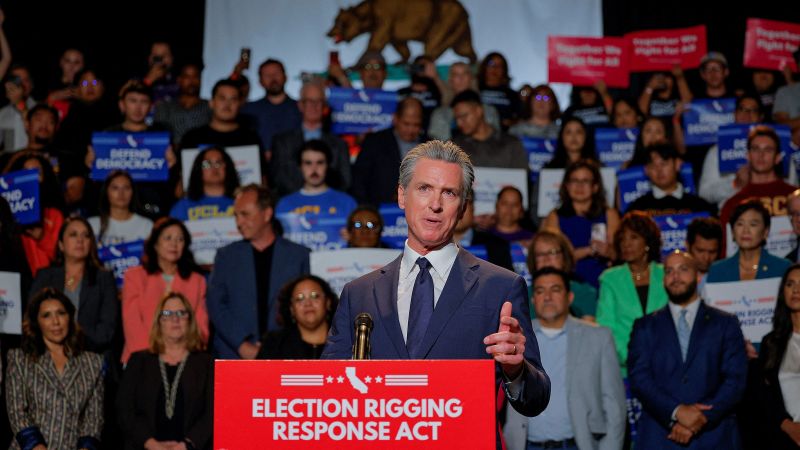On Thursday, California Governor Gavin Newsom officially commenced a critical initiative aimed at redrawing the state’s congressional maps. This effort is a direct reaction to a Republican-led initiative in Texas, designed specifically to bolster the Republican Party’s representation in the U.S. House of Representatives. Newsom hopes to counteract what he views as an aggressive gerrymandering tactic spearheaded by the Trump administration, hinting at a growing showdown between state interests and federal influences.
As Newsom and an array of allies, including labor leaders and congressional members, gathered in downtown Los Angeles to discuss these matters, U.S. Immigration and Customs Enforcement (ICE) agents were reportedly making arrests nearby. This juxtaposition of Newsom’s progressive agenda and the aggressive immigration enforcement by federal agents was not lost on him. He remarked, “You think it’s coincidental? Wake up, America. This is a serious moment,” highlighting the urgency of the situation at hand.
The governor further underscored his belief that the Democrats must take action to amend the independent redistricting commission’s findings, as he believes the Republicans are attempting to redraw the congressional boundaries to their advantage. “He doesn’t play by a different set of rules. He doesn’t believe in the rules,” Newsom asserted. His aggressive rhetoric was aimed at emphasizing the necessity of matching Republican strategies with similar tactics in California.
Unlike Texas, where Governor Greg Abbott is prepared to reconvene a special session to advance Republican-drawn maps once enough Democratic lawmakers return, California’s process is distinctively more cumbersome. Any new congressional maps proposed by Newsom and the state legislature will ultimately require approval by statewide voters in a referendum scheduled for November. The California legislative session is set to resume, and any proposed measures will need to clear both chambers with a two-thirds majority to make it onto the ballot.
Newsom indicated that the proposed congressional maps for California would be available within the upcoming days. However, he faces significant hurdles, especially considering the likelihood that turnout for an off-year referendum will be lower than for major elections. Already, a coalition is gathering to oppose the proposed changes, spearheaded by notable figures such as former Governor Arnold Schwarzenegger and various California Republicans, as well as advocacy organizations like the League of Women Voters. They argue that a substantial number of voters in California are opposed to altering the redistricting process mid-cycle, recalling the overwhelming passage of Proposition 20 in 2010, which took control of congressional maps away from the state legislature.
The initiative’s opposition is bolstered by influential advocates such as Charles Munger Jr., who was integral in passing Proposition 20 and has pledged to fight against what he perceives as detrimental changes. Despite Newsom’s push for the maps’ alteration, it has been challenging to unite the coalition of opposition and garner widespread support among voters. The task is made all the more difficult given that Common Cause, a significant advocate for good governance, opted not to unilaterally condemn mid-cycle redistricting efforts that meet specific criteria, reflecting a shifting stance within the organization.
As discourse surrounding the proposed changes continues, the League of Women Voters has taken a strong stand against the initiative, asserting that overriding current maps may cause long-term harm to California’s democratic processes. “We understand the urgency. Authoritarianism is not abstract; it is here, and it is dangerous,” penned Dora Rose, the deputy director of the League of Women Voters of California.
Divergent perspectives on how best to address the potential disparities brought on by gerrymandering will likely define the upcoming electoral landscape. Proponents hope to highlight California’s progressive stances, framing their argument as a necessary measure to counteract the partisan strategies employed in states like Texas. Meanwhile, opponents worry that the alterations could set a regrettable precedent and threaten the integrity of California’s previously established redistricting reforms.
As the political battle unfolds in California, it will be crucial for voters to receive comprehensive and accurate information to navigate these complex issues. Ensuring that the principles of fair representation are upheld is vital for the integrity of California’s democracy moving forward. The conversations and actions taken in the coming weeks will undoubtedly shape the political landscape for years to come.











